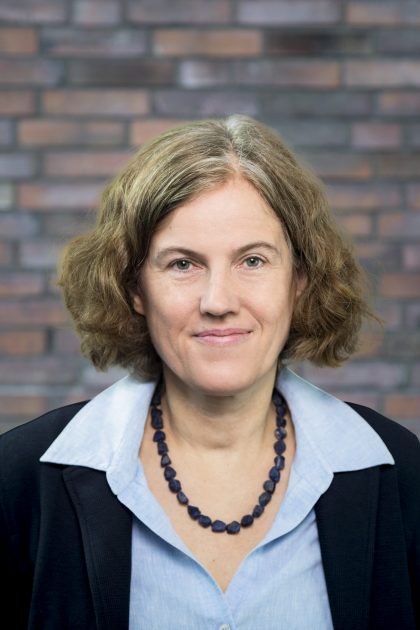
Prof. Dr. Rebecca Wade
Group Leader Molecular and Cellular ModelingContact
Phone: +49 6221 – 533 – 247
Fax: +49 6221 – 533 – 298
- Group leader of the Molecular and Cellular Modeling (MCM) group at HITS
- Professor at the Zentrum für Molekulare Biologie (ZMBH), Heidelberg University
- Group leader in the DKFZ-ZMBH Alliance
- Group leader at the Interdisciplinary Center for Scientific Computing (IWR)
Short biography
Rebecca Wade studied at the University of Oxford (B.A. Hons. in physics, 1985; D. Phil. in Molecular Biophysics, 1988). She then carried out postdoctoral research at the universities of Houston and Illinois before taking up a position as a group leader in the Structural and Computational Biology Programme at the European Molecular Biology Laboratory (EMBL) in Heidelberg in 1992. Rebecca Wade set up the Molecular and Cellular Modeling Group at HITS (which was then known as the European Media Laboratory and later as EML Research) in 2001. She was Adjunct Professor at the International University in Germany in Bruchsal from 2001-2003. Rebecca Wade was appointed full Professor at Heidelberg University in 2012 and is a member of the Faculty of Engineering Sciences and the Faculty of Biosciences. She was Scientific Director of HITS from 2015 to 2016.
Research interests
In the Molecular and Cellular Modeling group, our main focus is on proteins and finding out how they interact with their molecular binding partners and function. We develop and apply computational approaches to address questions such as: How do proteins recognize and distinguish their binding partners? How tightly and quickly do they bind? By what mechanisms do they bind? Can binding partners and binding modes be predicted? Our studies are mostly based on the three-dimensional structures of macromolecules. We aim to make concerted use of bioinformatics and physical simulation approaches in order to develop methods for understanding how biomolecules work and for aiding the rational design of therapeutic agents. Techniques cover a wide spectrum from interactive, web-based visualization tools to machine learning to molecular and Brownian dynamics simulations. Applications range from in-depth simulation studies of particular proteins to large-scale computational analysis of protein families.
See the Molecular and Cellular Modeling (MCM) group News for a glimpse of recent activities.
Professional activities and awards
- Editor-in-Chief: Journal of Molecular Recognition
- Editorial Board: Biophysical Journal (handling manuscripts), PLoS Computational Biology (handling manuscripts), Journal of Chemical Information and Modeling; Journal of Computer-Aided Molecular Design; Journal of Physical Chemistry B; BBA General Subjects; Biopolymers; Protein Engineering, Design and Selection;
- Member, Heidelberg University: Interdisciplinary Center for Scientific Computing (IWR) (Managing Board of Directors: 2020-2022); Steering committee: Thematic Research Network “Molecular Mechanisms in health and disease – from understanding to engineering (MINDS)”, CellNetworks Core Technology Platform (CCTP); Faculty: HGS MathComp Graduate School; Heidelberg Biosciences International Graduate School (HBIGS); Helmholtz Information & Data Science School for Health (HIDSS4Health)
- Member, Scientific Advisory Board: Leibniz-Institute for Molecular Pharmacology (FMP), Berlin-Buch (2013-2020); Max Planck Institute of Biophysics, Frankfurt (since 2015); Computational Biology Unit (CBU), University of Bergen, Norway (since 2018); ‘Complexity in Chemistry’ C2 Programme, Department of Chemical Sciences, University of Padova, Italy (since 2023).
- Mentor (2013-2017): BioMedX, Team SKI – Selective Kinase Inhibitors, Heidelberg
- Councillor (2010-2012): ISQBP (International Society of Quantum Biology and Pharmacology)
- Recipient of the 2004 Hansch Award of the QSAR and Modelling Society
- Recipient of the 2016 International Society of Quantum Biology and Pharmacology (ISQBP) Award in Computational Biology
- Molecular Graphics and Modeling Society (MGMS) 2020 Lecture tour, UK
- Chair (2022), 23rd EuroQSAR : European Symposium on Quantitative Structure-Activity Relationships, Heidelberg, Germany
- Scientific Chair (2022 – ): QSAR, Chemoinformatics and Modeling Society (QCMS)
- Coordinator (2021 – ), SIMPLAIX HITS-Heidelberg University-Karlsruhe Institute of Technology inter-institutional cooperation on multiscale simulation and machine learning of biomolecules and molecular materials.